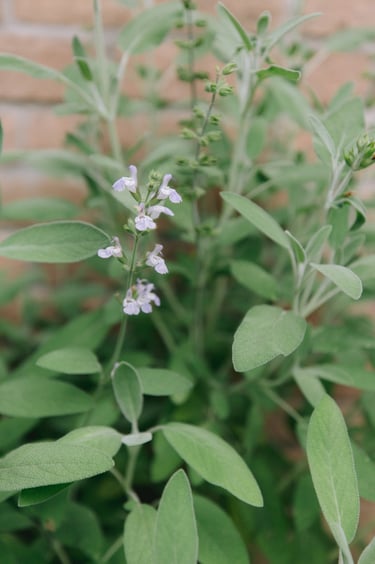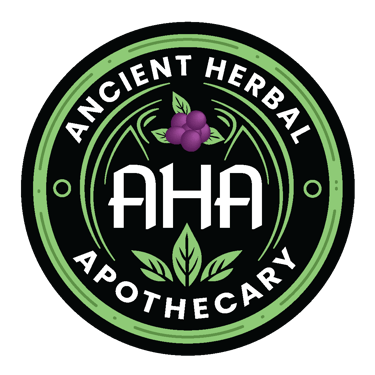Sage
The Magical Herb
Luann Morris
6/7/20243 min read
The Magical Herb: Sage
Sage, scientifically known as Salvia officinalis, is a herb that has been cherished for centuries for its aromatic fragrance, culinary uses, and purported medicinal properties. With its velvety leaves and earthy aroma, sage holds a revered place in various cultures around the world, not only for its culinary prowess but also for its potential health benefits and folklore.
Active Ingredients
Sage contains several active compounds that contribute to its medicinal properties, including:
1. Thujone: This compound is found in various herbs, including sage, and is believed to have antispasmodic and anti-inflammatory properties.
2. Rosmarinic acid: Known for its antioxidant and anti-inflammatory effects, rosmarinic acid is found in high concentrations in sage.
3. Carnosic acid: Another potent antioxidant present in sage, carnosic acid has been studied for its potential neuroprotective properties.
4. Apigenin: A flavonoid with anti-inflammatory and antioxidant properties, apigenin is found in sage and other plants.
5. Camphor: Though present in smaller amounts, camphor contributes to sage's distinct aroma and has mild analgesic properties.
Health Benefits
Sage has been traditionally used for various health purposes, and while scientific research is ongoing, some potential benefits include:
1. Improved Cognitive Function: Sage has been associated with enhanced memory and cognitive function. Some studies suggest that compounds in sage may help protect against age-related cognitive decline and neurodegenerative diseases like Alzheimer's.
2. Antioxidant Properties: The high concentration of antioxidants in sage may help protect cells from oxidative stress and reduce inflammation, potentially lowering the risk of chronic diseases such as heart disease and certain cancers.
3. Digestive Aid: Sage has been used to aid digestion and alleviate gastrointestinal discomfort. Its carminative properties may help relieve bloating, gas, and indigestion.
4. Anti-inflammatory Effects: Compounds like rosmarinic acid and apigenin in sage exhibit anti-inflammatory properties, which may be beneficial for conditions such as arthritis and asthma.
5. Antimicrobial Action: Sage has antimicrobial properties that may help fight off infections, particularly in the mouth and throat. It has been traditionally used as a natural remedy for sore throats, coughs, and mouth ulcers.
Contraindications
While sage is generally safe when consumed in culinary amounts, excessive intake or prolonged use of sage supplements may have adverse effects, particularly for certain individuals:
1. Pregnancy: Sage contains thujone, which can stimulate uterine contractions and potentially lead to miscarriage. Pregnant women should avoid consuming large amounts of sage.
2. Breastfeeding: Thujone can also be passed through breast milk and may affect nursing infants. Breastfeeding mothers should moderate their intake of sage.
3. Allergies: Individuals allergic to plants in the Lamiaceae family, such as mint, basil, or oregano, may also be allergic to sage and should exercise caution when consuming it.
4. Medication Interactions: Sage supplements may interact with certain medications, such as blood thinners or anticonvulsants. Consultation with a healthcare professional is advisable before adding sage supplements to your regimen, especially if you are on medication. Always consult your primary physician before beginning any supplements.
Folklore and Cultural Significance
Sage holds a rich tapestry of folklore and cultural significance across different societies:
- Native American Traditions: Sage has been used for smudging ceremonies by various Native American tribes to cleanse spaces of negative energies and promote spiritual purification.
- European Folk Medicine: In European folklore, sage was believed to possess magical properties, offering protection against evil spirits and bringing good luck to those who carried it.
- Culinary Heritage: Sage has long been revered in Mediterranean cuisine, where its robust flavor enhances dishes ranging from savory meats to stuffing and soups.
- Herbal Remedies: Throughout history, sage has been utilized in herbal medicine to treat ailments ranging from sore throats to digestive issues, earning it the moniker of "herb of immortality" in some cultures.
Sage is not merely a culinary herb but a botanical treasure with a storied past and promising future. While its health benefits and folklore continue to intrigue us, it's essential to approach its consumption with respect and mindfulness, recognizing both its potential benefits and contraindications. Whether used in a comforting cup of tea, a flavorful meal, or a cleansing ritual, sage remains a beloved companion on our journey towards wellness and spiritual harmony.


